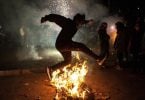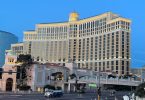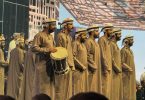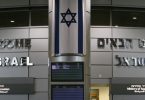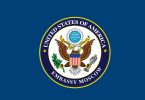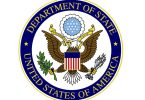When visiting Jerusalem, many tourists have a desire to visit the Temple Mount and the Dome of the Rock. The Temple Mount is a holy site within the Old City for Jewish, Christian and Muslim people. All visitors are able to tour the compound and the Al-Aqsa Mosque, with the exception of the Dome of the Rock.
Stabbings and clashes that left six people dead raised fears yesterday of further Israeli-Palestinian violence as tensions mount over new security measures at a highly sensitive Jerusalem holy site.
On July 19 A “Day of Rage” has been declared by Palestinian Authority President Mahmoud Abbas’ Fatah party, in response to the placement of metal detectors at entrances to Jerusalem’s Temple Mount—known to Muslims as Haram Al-Sharif—upon which the al-Aqsa mosque is located.
The installation was undertaken in the wake of last Friday’s attack at the holy site, in which three Arab-Israelis opened fire, killing two Israeli police officers—Hail Stawi, 30, and Kamil Shanan, 22, both Druze Muslims—and wounding a third. Thereafter, Israel also took the controversial step of completely blocking access to the complex for two days.
Palestinians rejected the Israeli insistence that the metal detectors were required in light of the ongoing violence and use of fire arms.
Speaking to The Media Line, Jamal Muhaisen, a member of Fatah’s Central Committee, said that protests are planned all over the West Bank, “the first of many escalating steps we will take if Israel does not remove the electronic gates.”
“It is a political matter, not a security one,” he insisted. “Israel is trying to increase its presence at the holy site and we will face it. We oppose the detectors to the end, even if we have to break them with our hands.” Muhaisen called on the Israeli government to reverse course by the end of the month, or Fatah would initiate the next phase of its plan.
As tensions mounted Wednesday, Jerusalem Mayor Nir Barkat released a statement defending the government’s decision, which he described as an appropriate measure for preventing future attacks: “The whole world has to understand that the Temple Mount can’t be used as a refuge or as a planning and meeting point for terrorists and murderers.… I suggest the demonstrators target their rage at the terrorists who created the need for [the metal detectors], and not the police.”
It is a sentiment widely shared by the Israeli public and most of its parliamentarians; that is, aside from members of Joint [Arab] List, which has taken a hard line on the matter, evidencing societal divisions drawn primarily along ethnic and religious lines. These tensions extend to the Palestinian territories—to the Arab-Islamic world, generally—where the metal detectors are viewed as an affront; contravening the longstanding “status quo” at the Temple Mount, a set of principles and compromises that form the basis for relations between Jews, Christians and Muslims at the complex.
For his part, PA Prime Minister Rami Hamdallah call[ed] on the international community and the Arab and Islamic states “to take responsibility for… stopping the occupation’s measures, which are in opposition to all laws, agreements and international charters.”
“What is happening,” Hamdallah warned, “is gross aggression and a dangerous Israeli plan… that will increase tensions in Jerusalem and the region, [with the potential to] ignite a religious war.”
Concurrently, officials from the Waqf—the Muslim Trust, a religious-administrative body that oversees Islamic holy sites in Jerusalem under Jordanian custodianship at Israel’s initiative—have staged their own protests in the Old City, encouraging worshippers to forego visiting al-Aqsa altogether. The latest move is a decision to close all Jerusalem mosques on Friday in an effort to amass thousands of worshipers—and demonstrators—at the gates of the Temple Mount.
Among the local Muslim population, the broad sentiment is one of anger: “The religious punishment is beyond imagination,” Rateb, 38, a resident of the Wadi al-Joz neighborhood in east Jerusalem, expressed to The Media Line. “Al-Aqsa is one of the holiest locations in the world and the Israelis are provoking people with what they are doing.”
Khadeja, another resident of east Jerusalem, believes Israel is trying to take control of the complex: She told The Media Line that “The mosque is facing daily violations. Israel has canceled the role of the Waqf, and the placing of metal detectors is a humiliation to Muslims.
“It is our house,” she concludes, “and you do not pass through security checks before entering one’s house.”
The potential for further violence was made stark Tuesday, as clashes erupted for a third straight night between hundreds of Muslims and Israeli security forces near the complex. According to local police, following evening prayers a group of worshipers “started throwing rocks and bottles at the officers” stationed in the Old City. Palestinian media reported that dozens were injured, along with two Israeli security personnel. Meanwhile, early Wednesday, the commander of Jerusalem’s District Police ordered the Temple Mount closed to non-Muslims, after a group of Jewish visitors was removed for praying, a violation of the “status quo.”
The sensitivity, severity, and explosive nature of the situation, along with its global implications, reportedly impelled Saudi Arabia’s King Salman to directly intervene by calling on Washington to act as a mediator in an effort to resolve the crisis. In response, Israeli Prime Minister Binyamin Netanyahu is said to have invited Saudi officials to visit al-Aqsa to see firsthand that the status quo does, indeed, remain in place.
But the lines appear to have been blurred. At risk, tensions boiling over, an all-too-familiar occurrence; the consequences, as the region’s history attests to, are potentially dire.
Dima Abumaria contributed to this report
(eTN): Holy Crisis also for Tourism in Jerusalem: Mount Over Al-Aqsa Metal Detectors | re-post license | post content







